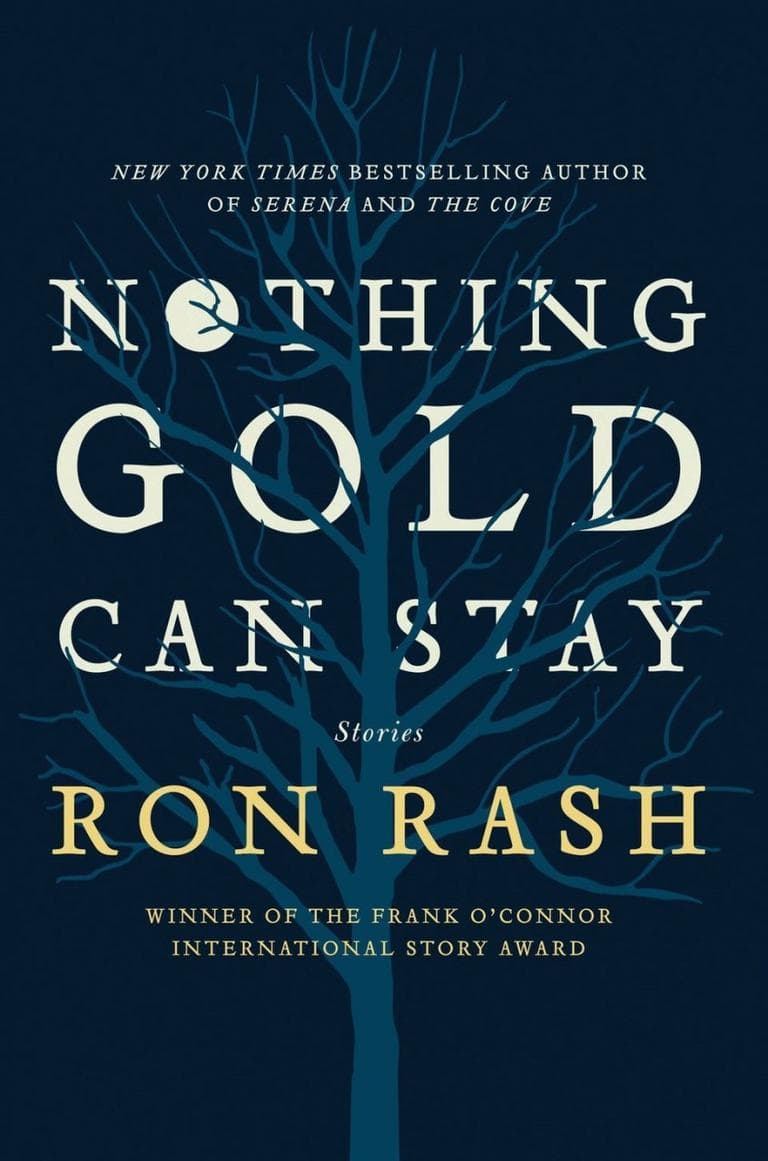Advertisement
Ron Rash Pens Stories of Desperation And Unexpected Hope

Critically acclaimed author Ron Rash is out with a new collection of short stories, "Nothing Gold Can Stay."
Rash's critically acclaimed best selling stories are often set in his home state of North Carolina. Janet Maslin of the New York Times called his 2008 novel, "Serena," "one of the greatest American novels of recent memory."
Rash's characters are often people in desperate circumstances. For example in "Cherokee," a young couple goes to a casino in hopes of winning enough money to save their truck, which is on the verge of repossession.
"A Servant Of History" is a black comedy of errors in which a pompous British academic visits an Appalachian town in search of ballads with English roots.
"Very often, their very lives are on the line, and that's when the essence of character is shown because people are stripped of the mask," Ron Rash told Here & Now's Robin Young.
But though his book is dominated by people who have been dealt a bad hand in life, Rash adds that for his characters "there are moments when hope glimmers and... very often even in the worst situations, they act decently."
- New York Times: Be Careful Of The Locals
- Here & Now: Author Ron Rash Delves Into North Carolina History For ‘The Cove’
- Here & Now: Literature, Music And Barbecue: Getting To Know N.C.
Book Excerpt "The Trusty" from "Nothing Gold Can Stay"
By: Ron Rash
They had been moving up the road a week without seeing another farmhouse, and the nearest well, at least the nearest the owner would let Sinkler use, was half a mile back. What had been a trusty sluff job was now as onerous as swinging a Kaiser blade or shoveling out ditches. As soon as he’d hauled the buckets back to the cage truck it was time to go again. He asked Vickery if someone could spell him and the bull guard smiled and said that Sinkler could always strap on a pair of leg irons and grab a handle. “Bolick just killed a rattlesnake in them weeds yonder,” the bull guard said. “I bet he’d square a trade with you.” When Sinkler asked if come morning he could walk ahead to search for another well, Vickery’s lips tightened, but he nodded.

The next day, Sinkler took the metal buckets and walked until he found a farmhouse. It was no closer than the other, even a bit farther, but worth padding the hoof a few extra steps. The well he’d been using belonged to a hunchbacked widow. The woman who appeared in this doorway wore her hair in a similar tight bun and draped herself in the same sort of flour-cloth dress, but she looked to be in her midtwenties, like Sinkler. Two weeks would pass before they got beyond this farmhouse, perhaps another two weeks before the next well. Plenty of time to quench a different kind of thirst. As he entered the yard, the woman looked past the barn to a field where a man and his draft horse were plowing. The woman gave a brisk whistle and the farmer paused and looked their way. Sinkler stopped beside the well but did not set the buckets down.
“What you want,” the woman said, not so much a question as a demand.
“Water,” Sinkler answered. “We’ve got a chain gang working on the road.”
“I’d have reckoned you to bring water with you.”
Advertisement
“Not enough for ten men all day.”
The woman looked out at the field again. Her husband watched but did not unloop the rein from around his neck. The woman stepped onto the six nailed-together planks that looked more like a raft than a porch. Firewood was stacked on one side, and closer to the door an axe leaned between a shovel and a hoe. She let her eyes settle on the axe long enough to make sure he noticed it. Sinkler saw now that she was younger than he’d thought, maybe eighteen, at most twenty, more girl than woman.
“How come you not to have chains on you?”
“I’m a trusty,” Sinkler said, smiling. “A prisoner, but one that can be trusted.”
“And all you want is water?”
Sinkler thought of several possible answers.
“That’s what they sent me for.”
“I don’t reckon there to be any money in it for us?” the girl asked.
“No, just gratitude from a bunch of thirsty men, and especially me for not having to haul it so far.”
“I’ll have to ask my man,” she said. “Stay here in the yard.”
For a moment he thought she might take the axe with her. As she walked into the field, Sinkler studied the house, which was no bigger than a fishing shack. The dwelling appeared to have been built in the previous century. The door opened with a latch, not a knob, and no glass filled the window frames. Sinkler stepped closer to the entrance and saw two ladder-back chairs and a small table set on a puncheon floor. Sinkler wondered if these apple-knockers had heard they were supposed to be getting a new deal.
“You can use the well,” the girl said when she returned, “but he said you need to forget one of them pails here next time you come asking for water.”
Worth it, he figured, even if Vickery took the money out of Sinkler’s own pocket, especially with no sign up ahead of another farmhouse. It would be a half-dollar at most, easily made up with one slick deal in a poker game. He nodded and went to the well, sent the rusty bucket down into the dark. The girl went up on the porch but didn’t go inside.
“What you in prison for?”
“Thinking a bank manager wouldn’t notice his teller slipping a few bills in his pocket.”
“Whereabouts?”
“Raleigh.”
“I ain’t never been past Asheville,” the girl said. “How long you in for?”
“Five years. I’ve done sixteen months.”
Sinkler raised the bucket, water leaking from the bottom as he transferred its contents. The girl stayed on the porch, making sure that all he took was water.
“You lived here long?”
“Me and Chet been here a year,” the girl said. “I grew up across the ridge yonder.”
“You two live alone, do you?”
“We do,” the girl said, “but there’s a rifle just inside the door and I know how to bead it.”
“I’m sure you do,” Sinkler said. “You mind telling me your name, just so I’ll know what to call you?”
“Lucy Sorrels.”
He waited to see if she’d ask his.
“Mine’s Sinkler,” he said when she didn’t.
He filled the second bucket but made no move to leave, instead looking around at the trees and mountains as if just noticing them. Then he smiled and gave a slight nod.
“Must get lonely being out so far from everything,” Sinkler said. “At least, I would think so.”
“And I’d think them men to be getting thirsty,” Lucy Sorrels said.
“Probably,” he agreed, surprised at her smarts in turning his words back on him. “But I’ll return soon to brighten your day.”
“When you planning to leave one of them pails?” she asked.
“Last trip before quitting time.”
She nodded and went into the shack.
From NOTHING GOLD CAN STAY by Ron Rash Copyright © 2013 by Ron Rash. Reprinted courtesy of Ecco, an imprint of HarperCollins Publishers.
Guest:
- Ron Rash, author of "Nothing Gold Can Stay"
This segment aired on April 1, 2013.